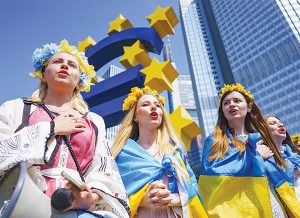Deliver us from evil. The line is among the most familiar, in one of the oldest Christian prayers. Most of us are wary about using the E-word, because grown-up people know that few issues, or indeed people, can rightfully be characterised as either wholly good or the other thing, but instead exist somewhere between.
Yet it seems hard to consider Russian President Vladimir Putin as anything other than a force for evil. He is personally responsible for tens of thousands of deaths in Ukraine through an act of unprovoked aggression, designed to fulfill a vision of
national and personal greatness that has no foundation in law or morality.
At least as appalling, through his strangulation of Ukrainian grain shipments he is inflicting hunger and threatening starvation upon a growing portion of the Southern Hemisphere.
This is why it hurts to say that it is hard to see an outcome of the catastrophe that punishes Putin and his nation as they deserve. Or one that restores to Ukrainian President Volodymyr Zelenskiy’s people the security and prosperity to which they are entitled.
In Britain today, emotions are running higher than in any other European country save Poland and the Baltic states. People like me, who assert skepticism about the prospects of Ukrainian victory, are widely derided as at best “ultra-realists†Â— not intended as a term of flattery — and at worst as appeasers. We lie awake nights, searching hearts and minds about whether the evidence indeed justifies our grim forecasts.
In a famous, or rather notorious, address to a committee of the Prussian parliament in 1862, Otto von Bismarck said: “Not through speeches and majority decisions will the great questions of the day be decided†but by “Blut und Eisen†— blood and iron. We like to believe that civilized 21st-century societies have advanced beyond such brutish doctrine. Yet Putin is attempting to demonstrate that he can exploit extreme violence to secure a vastly larger role on the world stage than Russia’s economic and political stature confers.
The Russian leader contemptuously defies the guiding spirit of such nations as Germany, industrial giant of Europe, which has long renounced Bismarckian principles: It has identified itself as a so-called “civilian power,†forswearing credible armed forces. Against this avowed pacifism, Putin is waging a new kind of asymmetric warfare. In the long term, a clumsy exertion of force cannot substitute for economic and social success. A critical difference between Bismarck’s Prussia and Putin’s Russia is that the former’s army was backed by a rising industrial nation, while the latter’s is yesterday’s superpower. The combined GDP of the North Atlantic Treaty Organization (Nato) nations is nearly 30 times that of Russia’s, and their defense spending is 15 times that of the Kremlin’s.
Yet to meet Putin’s aggression, Europe needs to liberate itself from Russian energy bondage and to rearm. Both these measures require time, during which Putin’s soldiers are advancing in the Donbas region. As of now, even the best-armed, or least weak, European allies — Britain, France and Germany — would require months to put into the field a single battleworthy division.
The might and commitment of the US are indispensable. RD Hooker Jr, a former dean of the alliance’s defense college, wrote recently: “NATO must have the will to compete, and the US must lead and encourage.â€
In the immediate term, Putin’s blood-and-iron policy seems likely to succeed, because even a blundering Russian army is stronger than the Ukrainian one.
My friends now serving in the military predicted weeks ago that Zelenskiy’s forces should be able to prevent an absolute Russian conquest of Ukraine. They have always also argued, however, that the chances of Kyiv ever retaking the occupied Donbas are “zero†Â— a general’s word, not mine — no matter what weaponry the West supplies. Russia is fortifying the territories it has seized. Despite its army’s stunning losses and poor morale, Putin still has at his disposal an inventory of unused weapons, some of them horrible. Only direct Western military intervention offers a prospect of tilting the odds decisively against Russia.
There is a case for US and allied warships to escort vessels carrying Ukrainian grain to and from Odesa, defying Putin to fire on them. At present, however, President Joe Biden’s administration seems wary of taking this step, which might precipitate general war. It is almost unthinkable that US forces will be directly committed.
Many Americans, not all of them Republicans, think that their country is already staking too much in Europe, when China remains the more dangerous adversary. The frustration of national objectives over two decades in Iraq, Libya and Afghanistan makes the skeptics unwilling to see the US again commit to a messy struggle in a faraway country that costs blood and treasure, while securing little glory. The domestic politics of another unsuccessful American war look terrible. Putin, thinking long as usual, is surely calculating that the 2024 presidential election will return to the White House either former President Donald Trump or a Trump clone, opposed to deeper entanglements — perhaps to any entanglement at all — in a European showdown with Russia. A US retreat from Europe would leave Ukraine dependent on European military, political and economic support, a grim prospect indeed, because the US supplies more than 80% of its aid.
—Bloomberg
Max Hastings is a Bloomberg Opinion columnist. A former editor in chief of the Daily Telegraph and the London Evening Standard, he is author, most recently, of “Operation Pedestal: The Fleet That Battled to Malta, 1942â€
 The Gulf Time Newspaper One of the finest business newspapers in the UAE brought to you by our professional writers and editors.
The Gulf Time Newspaper One of the finest business newspapers in the UAE brought to you by our professional writers and editors.

